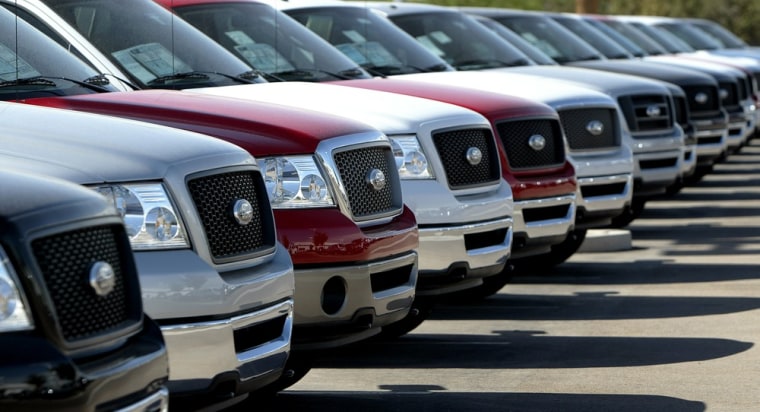Ford bowed to pressure from regulators on Thursday and widened a recall of America's top-selling vehicle, the F-150 pickup, because its air bags can deploy at the wrong time.
The recall now covers nearly 1.2 million F-150s built for the 2004 and 2005 model years and some built for 2006. An electrical short can cause the air bags to inflate without a crash and could injure drivers.
Ford Motor Co. in February said it would fix the problem in 150,000 trucks but had resisted the government's wishes to expand the recall.
The widened recall shows how regulators have become more aggressive since being criticized last year for a slow response to unintended acceleration problems in Toyota vehicles. It's also a sign that it will be harder for Ford and other automakers to limit the size of future recalls.
The National Highway Traffic Safety Administration, which regulates car safety, knows of 269 cases in which the air bags have deployed inadvertently, resulting in 98 injuries, some serious.
When Ford resisted NHTSA's request to expand the recall over the winter, the safety agency said it could hold a rare public hearing. "The potential for loss of vehicular control poses an unreasonable risk to safety," NHTSA told the company.
Before Toyota's spate of unintended acceleration recalls last year, NHTSA probably wouldn't have made Ford expand the recall, said Joan Claybrook, a former administrator at the agency who previously led consumer group Public Citizen.
But the agency has become more aggressive since being criticized over Toyota's problems, she said.
She said NHTSA could end up fining Ford for not recalling all the vehicles back in February. Toyota paid the government a record $48.8 million in fines for its handling of three recalls.
Ford, like most automakers, will delay recalls to limit their size and cost, Claybrook said.
Ford said it will tell owners next month to take their trucks to a dealer to replace an air bag wire in the steering wheel. The wire can become chafed, causing a short circuit that can lead to the air bag inflating unexpectedly. The repair takes less than a half day, the company said.
The problem was fixed at Ford's factories in January 2006, so trucks made after that date are not susceptible to it.
Ford spokesman Wes Sherwood said the company didn't recall the trucks five years ago because it didn't think there was a safety risk. Also, Ford officials didn't think a large recall was necessary because the electrical short would first set off a dashboard light warning of an air bag problem.
"We thought the air bag warning lamp was sufficient notice to customers that the vehicle needed service well before air bag deployment, and most owners would then get it serviced," he said.
Ford also determined that most of the trucks with the problem were made at a now-closed factory in Norfolk, Va., and those were included in the February recall, he said.
The F-150 traditionally is the top-selling vehicle in America and makes up about 18 percent of Ford's sales. It has been a profit center for the company. Well-equipped trucks sell for over $40,000.
Thursday's expanded recall also includes 16,000 Lincoln LT pickups from the 2006 model year.
Claybrook contends that Ford didn't recall all the trucks at once in order to save money, an allegation that Ford denied.
A Barclay's analyst estimated Thursday that the recall would cost Ford about $180 million, or $150 per truck. Claybrook said the per-vehicle cost is expensive compared with other recalls.
Air bags have saved thousands of lives and reduced injuries. But they can hurt people because they inflate quickly. Most injuries are scrapes from contact with the bag and burns from the gasses that inflate them.
Ford told NHTSA that F-150 drivers reported burns, bruises, neck and back pain and minor cuts. Two customers reported broken or chipped teeth, and two reported a broken elbow or arm. Ford said it knows of no crashes caused by the air bag problem.
Drivers are less likely to be hurt by air bags that inflate randomly than by bags that go off during a crash, said Matthew Reed, an auto safety expert with the University of Michigan Transportation Research Institute who has studied air bag injuries for 22 years.
Air bags are designed to protect someone who is sitting in a driving position, and injuries are more likely when they are out of that position, Reed said. In crashes, people are often out of position due to heavy braking, swerving or other movements.
"If anything, a random air bag deployment is more likely to catch the occupants in a position that the air bags were designed for," he said.
